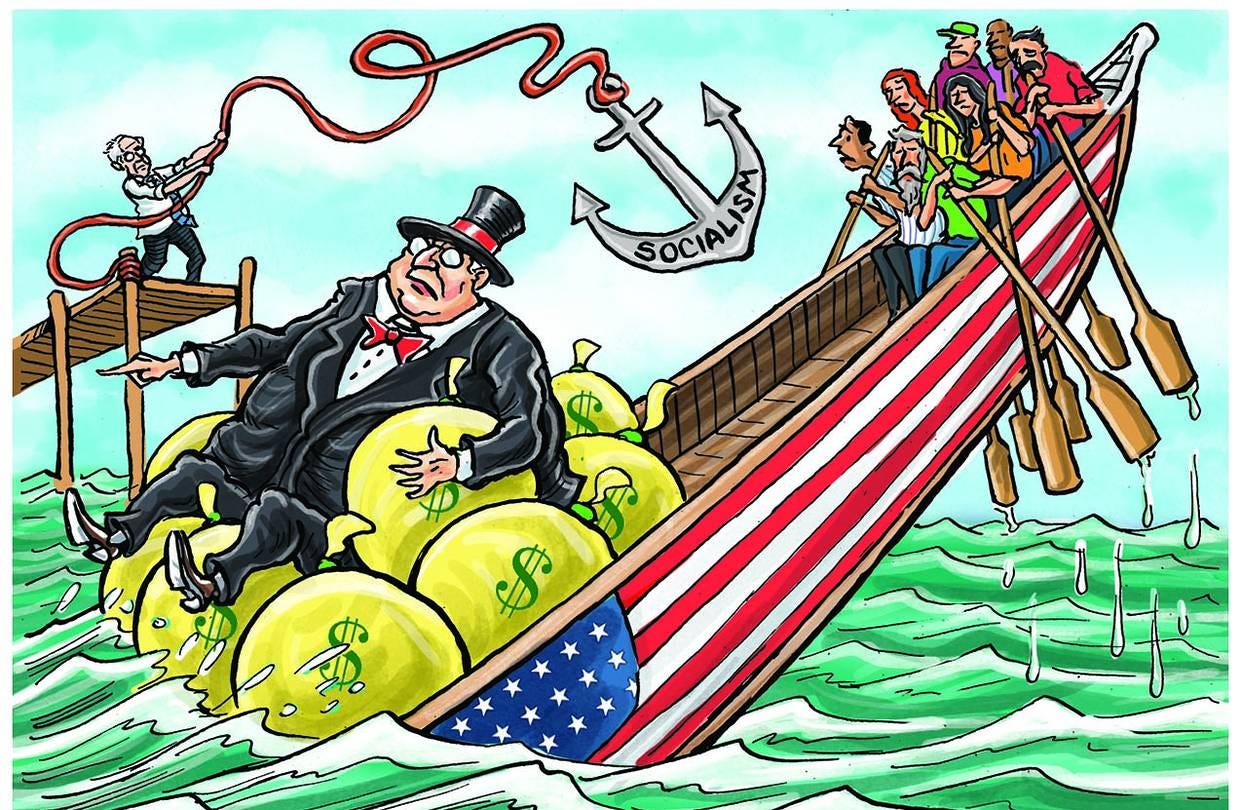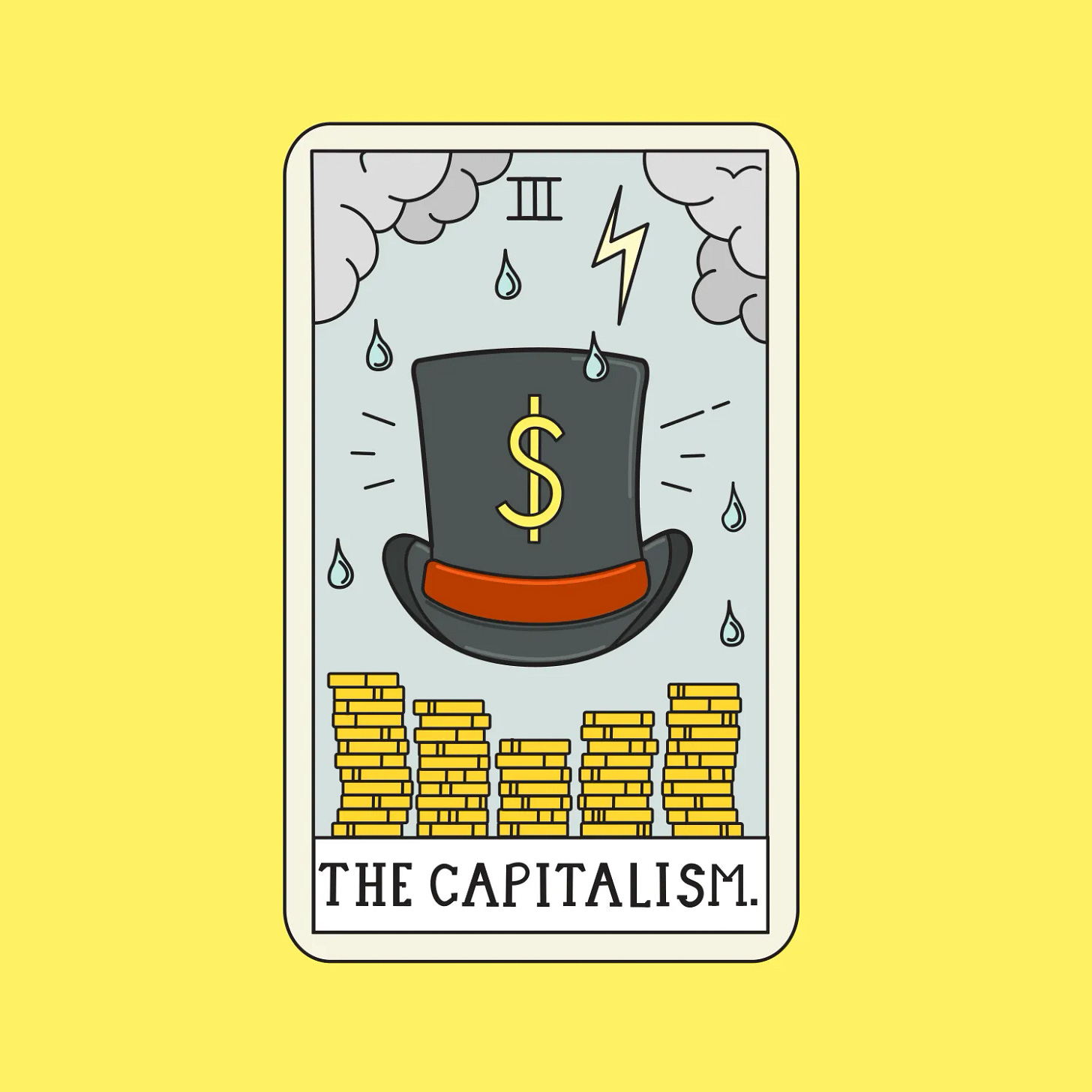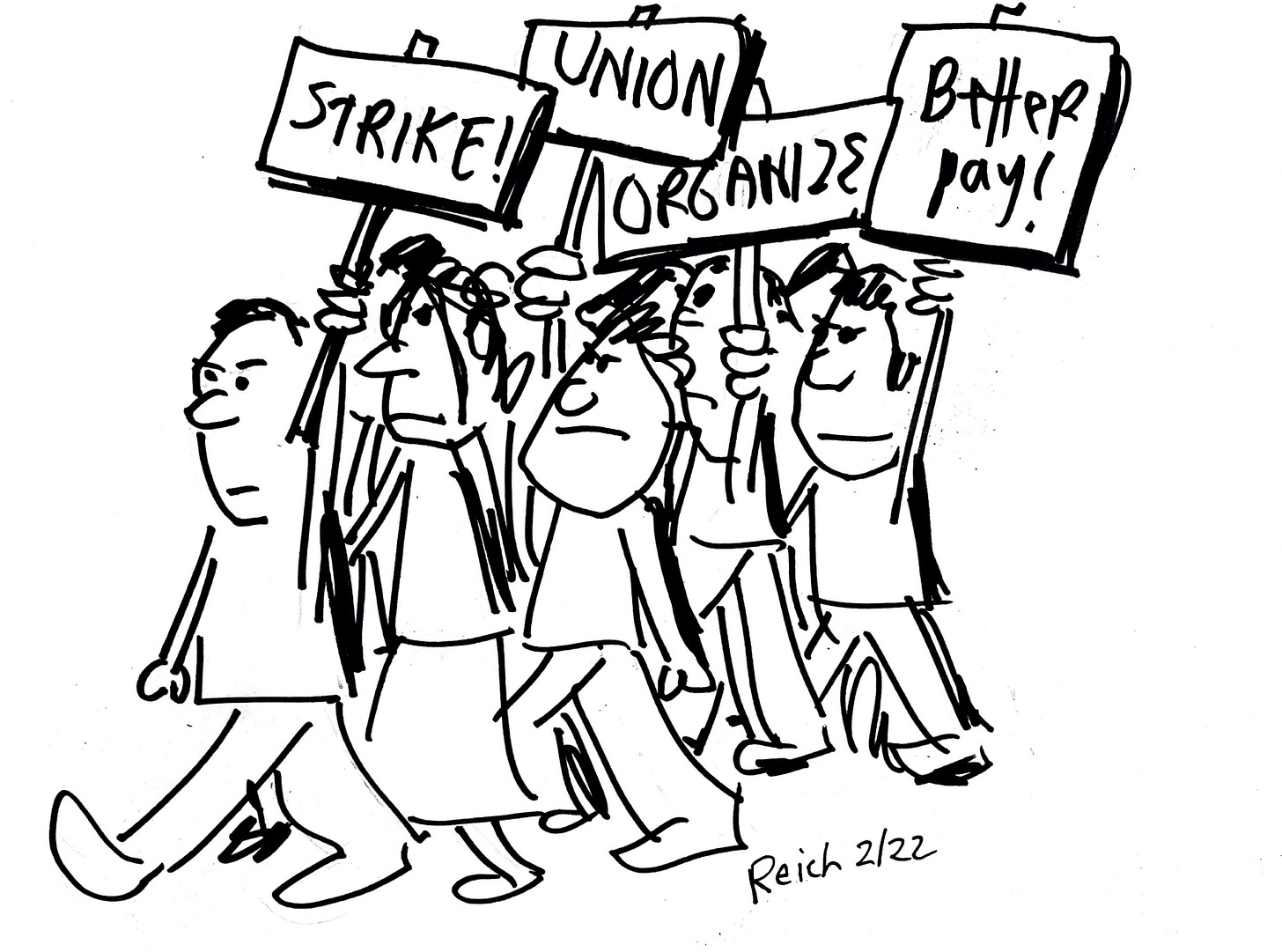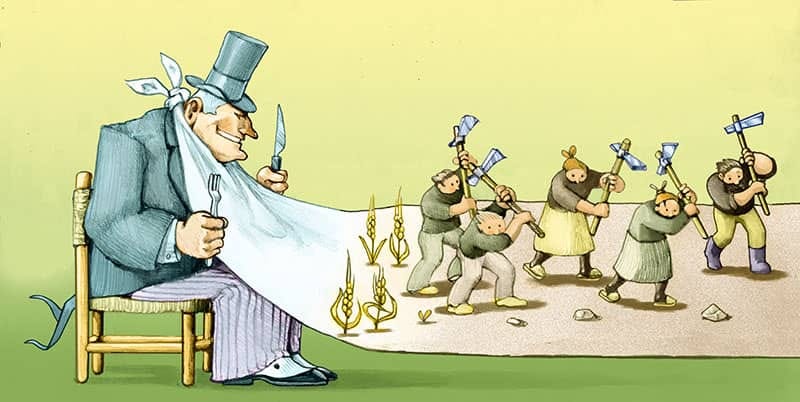Beyond Trump (Why is American Capitalism so Rotten? Part 1)
What really happened to the American dream
Friends,
Welcome to our 10-week look into the conflicts between the common good and American capitalism.
Today is a good day to begin. It’s known as Black Friday because it marks the day when small retailers — like my father, Ed Reich, who owned a shop on the main street from which he sold women’s clothing to the wives of factory workers — end months of losses (during which time he was “in the red”) and finally start earning a profit (going “into the black”).
For my father, it was the day holiday shoppers crowded into his shop for early pre-Christmas sales. My mother joined him in the store — waiting on the swarming consumers, wrapping their purchases, keeping the whole chaotic process going.
Despite the chaos, I recall how relieved they both were. By the end of the holiday season, my father had usually earned enough to pay the bills, with something left over to carry us through the first part of the following year. We weren’t rich but never felt poor, and our standard of living rose steadily through the 1950s and 1960s — as factory workers and their spouses did better and better.
IT WAS A TIME when the income of a single factory worker or schoolteacher or baker or salesman or mechanic was enough to buy a home, have two cars, and raise a family.
For three decades after World War II, America created the largest middle class the world had ever seen. During those years, the earnings of the typical American worker doubled, just as the size of the American economy doubled.
Over the last 40 years, by contrast, the size of the economy has doubled again, but the earnings of the typical American have gone nowhere.
Then, the CEOs of large corporations earned an average of about 20 times the pay of their typical worker. Now, they rake in over 300 times.
In the 1950s and 1960s, the richest 1 percent of Americans took home 9 to 10 percent of total income. Today they take home more than 40 percent.
Then, the economy generated hope. Hard work paid off. The living standards of most people improved through their working lives. Their children enjoyed better lives than they had. Most people felt that the rules of the economic game were basically fair.
Although many women, Black people, and Latino people were still blocked from getting a fair share of the economy’s gains, the nation committed itself to change. Laws guaranteeing equal opportunity, laws against discrimination, laws promoting affirmative action, laws expanding educational opportunity — all began to take hold.
Today, confidence in the economic system has sharply declined. Its apparent arbitrariness and unfairness have undermined the public’s faith in it. Cynicism abounds. Equal opportunity is no longer high on the nation’s agenda.
To the contrary, our economic and political system seems rigged. That’s because it is.
THE THREAT TO CAPITALISM is no longer communism or fascism but a steady undermining of the trust modern societies must depend on.
When most people stop believing they and their children have a fair chance to make it, the tacit social contract begins to unravel. And a nation becomes susceptible to demagogues such as Donald Trump.
We have the power to change all this, recreating an economy that works for the many rather than the few. But to determine what must be changed, and to accomplish it, we must first understand what has happened and why.
The conventional explanation is that globalization and technological change have made most Americans less competitive. The tasks we used to do can now be done more cheaply by lower-paid workers abroad or by computer-driven machines. Artificial intelligence will only accelerate this trend.
The conventional solution — at least among people who call themselves liberals, Democrats, and progressives — has been an activist government that raises taxes on the wealthy, invests the proceeds in excellent schools and other means people need to get ahead, and redistributes to the needy.
This solution has been vigorously opposed by those who believe the economy will function better for everyone if government is smaller and if taxes and redistributions are curtailed.
BUT THE CONVENTIONAL EXPLANATION for what has happened overlooks a critically important phenomenon: the increasing concentration of political power in a corporate and financial elite that has been able to influence the rules that run the economy.
And the conventional solution is in some ways beside the point, because it takes insufficient account of the corruption of government by the moneyed interests.
The debate over the merits of the “free market” versus an activist government has diverted attention from how the market has come to be organized differently from the way it was a half-century ago, why its current organization is failing to deliver the widely shared prosperity it delivered then, and what the basic rules of the market should be.
The diversion of attention is not entirely accidental.
Many of the most vocal proponents of the “free market” — including executives of large corporations and their ubiquitous lawyers and lobbyists, denizens of Wall Street and their political lackeys, and numerous multimillionaires and billionaires — have for many years been actively reorganizing the market for their own benefit and would prefer these issues not be examined.
MARKETS DEPEND for their very existence on rules governing property (what can be owned), monopoly (what degree of market power is permissible), contracts (what can be exchanged and under what terms), bankruptcy (what happens when purchasers can’t pay up), labor unions, and how all of this is enforced.
Such rules do not exist in nature. They must be decided upon, one way or another, by human beings. These rules have been altered over the past four decades as large corporations, Wall Street, and wealthy individuals have gained increasing influence over the political institutions responsible for them.
Simultaneously, centers of countervailing power that between the 1930s and 1980s enabled America’s middle and lower-middle classes to exert their own influence — labor unions, small businesses, small investors, and political parties anchored at the local and state levels — have withered.
The consequence has been a market organized by those with great wealth for the purpose of further enhancing their wealth.
This has resulted in ever-larger upward distributions inside the market, from the middle class and poor to a minority at the top. Because these distributions occur inside the market, they have largely escaped notice.
As we’ll see, the meritocratic claim that people are paid what they are “worth” in the market is a tautology that begs the questions of how the market is organized and whether that organization is morally and economically defensible.
In truth, income and wealth increasingly depend on who has the power to set the rules of the game.
CEOs of large corporations and Wall Street’s top traders and portfolio managers effectively determine their own pay, advancing market rules that enlarge corporate profits while also using inside information to boost their fortunes.
Meanwhile, the pay of average workers has gone nowhere, because they have lost countervailing economic power and political clout. The simultaneous rise of both the working poor and non-working rich offer further evidence that earnings no longer correlate with effort or with the common good.
All of this has brought us Donald Trump and America’s lurch toward fascism.
The underlying issue is not the size of government, but whom the government is for.
The remedy is for the vast majority to regain influence over how the market is organized. This will require a new countervailing power, allying the economic interests of the majority who have not shared the economy’s gains.
The current left-right battle pitting the “free market” against government is needlessly and perversely preventing such an alliance from forming.
The biggest political divide in America in years to come will be between the complex of large corporations, Wall Street banks, and the very rich that has fixed the economic and political game to their liking, on the one side, and on the other side the vast majority, who, as a result, have been left behind.
The answer is not to give up on democracy.
To the contrary, the only way to reverse course is for the vast majority who now lack influence over the rules of the game to become organized and unified, in order to reestablish the countervailing power that was the key to widespread prosperity five decades ago.
IF WE DISPENSE with mythologies that have distracted us from the reality we find ourselves in, we can make the system work for most of us — rather than for only a relative handful.
History provides some direction as well as some comfort, especially in America, which has periodically readapted the rules of the political economy to create a more inclusive society while restraining the political power of wealthy minorities at the top.
In the 1830s, the Jacksonians targeted the special privileges of elites so the market system would better serve ordinary citizens.
In the late 19th and early 20th centuries, progressives enacted antitrust laws to break up the giant trusts, created independent commissions to regulate monopolies, and banned corporate political contributions.
In the 1930s, New Dealers limited the political power of large corporations and Wall Street while enlarging the countervailing power of labor unions, small businesses, and small investors.
The challenge is not just economic but political. It’s time for the Democratic Party and its leaders to give full-bodied voice to the forces — labor unions, small businesses, worker cooperatives, worker-owned businesses, family farmers, nonprofits, bottom-up politics, and all of us who are still committed to the common good — that together can countervail the overwhelming power of the big monied interests.
The two realms — economics and politics — cannot be separated. Indeed, the field on which I draw used to be called “political economy” — the study of how a society’s laws and political institutions relate to a set of moral ideals, of which a fair distribution of income and wealth was a central topic.
The emergence of economics as a discipline distinct from political economy began in 1890 with the publication of Alfred Marshall’s Principles of Economics.
The study of both economics and many other aspects of society thereafter began shifting from historically specific political, moral, and institutional relationships to more universal and scientific “laws.” John Maynard Keynes’s The General Theory of Employment, Interest, and Money (1936) dominated American economic policy from the end of World War II until the late 1970s.
After World War II, under the powerful influence of Keynesian economics, the focus shifted away from questions of politics and morals and toward government taxes and transfers as means of both stabilizing the business cycle and helping the poor. For many decades, this formula worked.
Rapid economic growth generated widespread prosperity, which in turn created a buoyant middle class. We did not have to attend to the organization of the political economy or be concerned about excessive economic and political power at its highest rungs.
Now, we do.
In a sense, then, the issues we’ll grapple with in this letter over the next 10 weeks harken back to an earlier tradition of inquiry, and a longer-lived concern.
My optimism is founded precisely in that history. Time and again we have saved capitalism from its own excesses. I am confident we will do so again.
Next Friday, we’ll examine in depth what I consider to be the biggest and most dangerous myth about capitalism, which has prevented Americans from understanding who is now controlling it.
***
Thank you for joining me on this expedition. Please add your comments, take part in our discussion, and share with others.
Subscribers to this newsletter are keeping it going. If you are able, please consider a paid or gift subscription.









Robert Reich hit the nail on the head in this essay. Note that tRump’s MAGA slogan accidentally articulates what needs to happen. It’s as if tRump recognized this and tapped into the anger that this perversion of capitalism created, while casting the blame for it on immigrants of color swarming over the border, and 38% of the population love the recognition that the system is rotten AND tRump’s explanation about why it’s turned rotten.
“I love the uneducated.”
Please read and share.